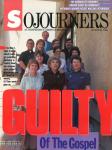Is it a sin to build a nuclear weapon? That question is becoming more and more central to the church debate on nuclear weapons, as two of the three largest denominations in the country took actions this spring that called into question the possession of nuclear weapons for deterrence.
Since 1945 deterrence in its various forms has been the philosophical cornerstone of the nuclear arms race. Each new U.S. weapon system through the years has been necessary, we were told, to maintain a credible deterrent against the Soviet threat. Variations and refinements of the theme, from "massive retaliation" to "flexible response," provided an excuse for even the most threatening and provocative advances in nuclear technology. The doctrine of deterrence has long provided the rationale for basing our entire defense policy on the insane threat of mass annihilation.
During the past six years, however, an important shift has occurred in the churches' stance toward nuclear weapons. In addition to the witness of communities of faith and resistance and the faithful stance of the historic peace churches, virtually every denomination in the United States has come out with a statement condemning the unrelenting arms race.
Yet until this year the mainstream church bodies in this country have not questioned the philosophy of deterrence. While church statements have raised moral questions about the use of nuclear weapons, the possession of nuclear weapons as part of a strategy of deterrence has been seen as a morally permissible evil. Churches have criticized everything about the arms race except the existence of nuclear weapons themselves.
This refusal to clearly condemn the basis of the arms race has helped to provide a moral legitimacy for the existence of nuclear weapons. Even the church's conditional acceptance of deterrence has contributed to the public acquiescence to nuclear weapons. It has made possible the relentless expansion of the nuclear stockpiles, since deterrence has been the rationale for every new nuclear development in the past four decades.
The year 1986 may well come to be seen as a watershed year in the process of removing the moral sanction for nuclear weapons. This spring the U.S. Catholic bishops began a formal review of their "conditional acceptance" of the possession of nuclear weapons for deterrence, the interim ethic at the core of their 1983 pastoral letter, "The Challenge of Peace."
The bishops' letter concluded that the possession of nuclear weapons was only morally acceptable in the context of active measures toward disarmament. In the wake of the escalating arms race in the three years since the letter's release, the bishops have formed a committee to examine whether possession of nuclear weapons can still be judged morally permissible.
THE BISHOPS OF the United Methodist Church have gone a step further with their peace pastoral letter, "In Defense of Creation," released this spring. They proclaim a "clear and unconditioned no" to any use of nuclear weapons and conclude that "deterrence must no longer receive the churches' blessing, even as a temporary warrant for the maintenance of nuclear weapons."
While clearly and explicitly building on the Catholic pastoral process, the Methodist letter's clarity, courage, and conviction serve as a challenge to the Catholic bishops and to all Christian churches: The church can no longer serve as apologist for the existence of nuclear weapons. "The moral case for deterrence," the letter states, "even as an interim ethic, has been undermined by unrelenting arms escalation. Deterrence no longer serves, if it ever did, as a strategy that facilitates disarmament."
The Methodist bishops' document is clear and unequivocal in its rejection of nuclear deterrence. The letter calls for a severing of the "idolatrous connection between the ideology of deterrence and the existence of the weapons themselves." Deterrence, the paper continues, has become the "dogmatic license for perpetual hostility between the superpowers and for their rigid resistance to significant measures of disarmament" and has "too long been reverenced as the unquestioned idol of national security." They call deterrence an "ideology of conformity too frequently invoked to disparage dissent and to dismiss any alternative foreign policy proposals."
The Methodist bishops present their own alternative policy proposals with their support for a comprehensive test ban, a freeze on nuclear weapons production and deployment, a policy of no first use of nuclear weapons, and a ban on all weapons in space.
The 84-page "foundation document," which fleshes out the four-page pastoral letter, explicitly rejects the Reagan administration's Star Wars proposal as a "dangerous and foolish technical fix" to the essentially political problems in U.S.Soviet relations. The bishops stress that the arms race is not, in its essence, a question of technology, but rather a crisis of human community.
At its heart "In Defense of Creation" is a call to action. If the nuclear arms race is morally indefensible, responsible discipleship requires that individual Christians, churches, and church bodies become "evangelists of shalom" by taking active steps to resist nuclear weapons.
The first step is confession: We must examine our hearts and our lives to find the places where we are complicit with the violence of the arms race. What is required of us, and what resounds clearly in the words of the Methodist pastoral, is a call to faithfulness and trust—not in weapons—but in the God of creation.

Got something to say about what you're reading? We value your feedback!